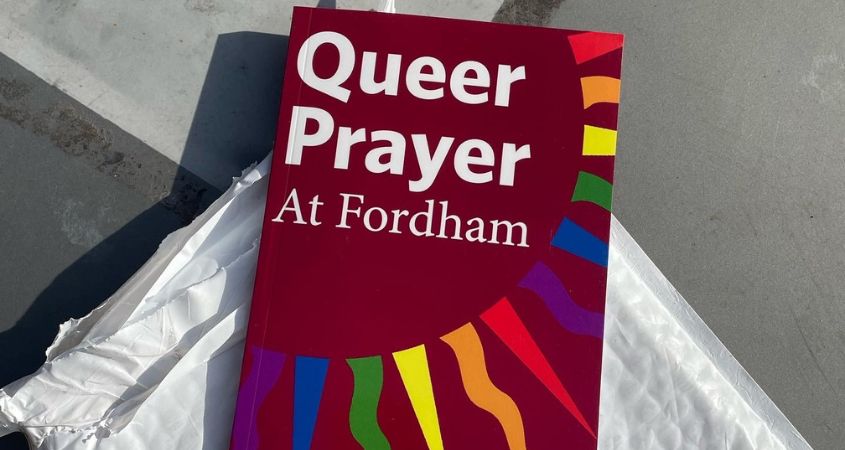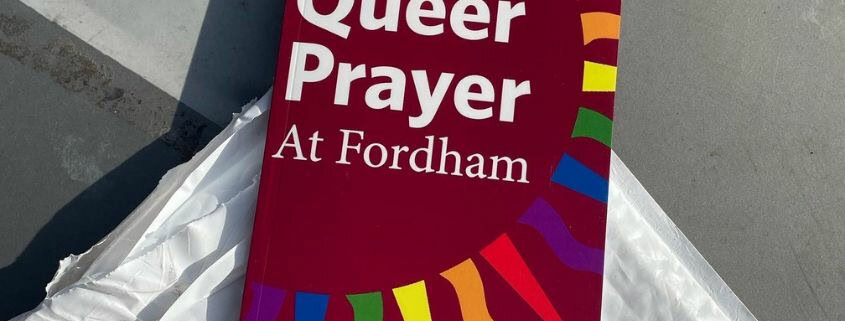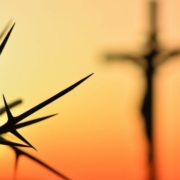Day 7: Prayer in the Chaos
BY BENEDICT REILLY | February 28, 2023
Today’s Readings
In my junior year at Fordham, I embarked on a project asking fellow queer students, faculty, and staff how they pray. A gay priest told me he prays with the Merton Prayer because it gives him the trust to walk with God along an unfamiliar path. An asexual woman finds comfort in the Hail Mary as she discerns motherhood. Patient Trust empowers a Catholic high school teacher to be an active witness for his students. One woman told me she prays with “The Greatest Love of All” (yes, the Whitney Houston song) because it gives her the power to love others by first loving herself.
What I have found in the ways queer Catholics experience prayer is a beautiful symphony from God, providing clarity on the parts of them that are disparate, broken, and in need of mending—the parts that live in chaos. The uniting thread of each person’s story is that their prayers opened them to allowing God to become active in their life in dynamic ways. They developed a new understanding of the world. Each time they pray is then both a reminder of that first moment and a call to further their journey of understanding. Each time they pray is a journey to wholeness. In today’s Gospel passage, Jesus teaches us how to pray. Fundamentally, he tells us that God knows what we will need before we even ask for it—God is the active subject. Our conversations with God do not return void, but “achieve the end for which [God] sent it” (Is 55:11). This is why we pray that God’s Kingdom exists “on earth as it is in heaven” (Mt 6:10): prayer is the vehicle by which God imparts understanding of love and justice upon us so that we can go forth and build them on earth.
In today’s Gospel passage, Jesus teaches us how to pray. Fundamentally, he tells us that God knows what we will need before we even ask for it—God is the active subject. Our conversations with God do not return void, but “achieve the end for which [God] sent it” (Is 55:11). This is why we pray that God’s Kingdom exists “on earth as it is in heaven” (Mt 6:10): prayer is the vehicle by which God imparts understanding of love and justice upon us so that we can go forth and build them on earth.
In prayer, God speaks love to all—to the asexual woman and gay priest as the Gentile and the Jew. God clarifies chaos, unifies brokenness, and heals shame. Listening in prayer is an important way we find clarity—we find God—out of the chaos (or, in today’s reading, “babble”) of everyday life.
For Reflection:
- How does, or can, your prayer life provide clarity on the parts of you “that are disparate, broken, and in need of mending—the parts that live in chaos?”
- How can you be more attentive in prayer to grow in your understanding and embodiment of God’s love and justice?
Benedict Reilly (he/him) is a senior undergraduate at Fordham University in New York City. He is the editor of Queer Prayer at Fordham and chair of Ignatian Q 2023, a conference for LGBTQ+ students at Jesuit colleges and universities.









I start my day with spiritual hymns that I’ve downloaded to Apple Music and can easily enjoy in the car. Be Not Afraid, one Bread One Body, You are Near, for example.
When my father unexpectedly passed, I sang these songs on repeat in my mind. I realized that they are the prayers I connect most easily to. Wonderful post!
I loved learning and was touched by the creative ways to approach prayer. But I was a bit concerned to read the lines about praying to “mend” the “broken” parts of oneself. “Disparate” doesn’t necessarily mean “bad”. Maybe it’s meant to heal one’s experience of being hurt by the reactions of others to one’s “disparate” sexuality. We are all “broken” in some ways, but I sincerely hope the author doesn’t consider himself or other queer persons to be “broken” solely because they were not created heterosexual.
Thank you for your comment, Judith. Your third sentence hits on precisely the intent of the author—to find healing from hurt, from being made to feel disparate, or othered—that prayer is a recentering on God’s universal, enduring love. We are all certainly “broken” in our own ways, and can find healing and love and an ability to focus on building a more justice world through prayer, as the author suggests.
I use the Pray as You Go App to center my prayer daily. The Jesus Prayer is one I use when my words fail. Sometimes at night, I clench the rosary, to lessen my fear.
Prayer for me is a conversation with God. When in a quandary, I need to remember to ask what shall I do?
It is easier to connect and listen in nature where the latest work of God our Creator is visible/audible/available to us through all our senses.
Not sure I understand. Is there a suggestion here that there is something inherent in being queer that is wrong. Is acting in a queer manner With same sexrelationships disorder, chaotic?
Thank you for your comment, Ron. The author is not suggesting this in the least, but that the world in which those who identify as queer, or LGBTQ+, can leave individuals feeling broken, shameful, or disordered—the unaccepting world can create chaos in this way. The author is writing about finding healing through prayer, as a reminder of God’s universal love, and “the vehicle by which God imparts understanding of love and justice upon us so that we can go forth and build them on earth.”
Prayer uplifts the downtrodden. Long live prayer.
I can’t do it alone.
How can you be more attentive in prayer to grow in your understanding and embodiment of God’s love and justice?
I find that repeating “Be still and know that I am God” helps me to settle in my prayer and listen to/for the Lord.
God created humans in his image—male and female he created them. God does not make mistakes in my view. LGB@Q have enough problems in their life .I’m happy they can find peace and wholeness in prayer.